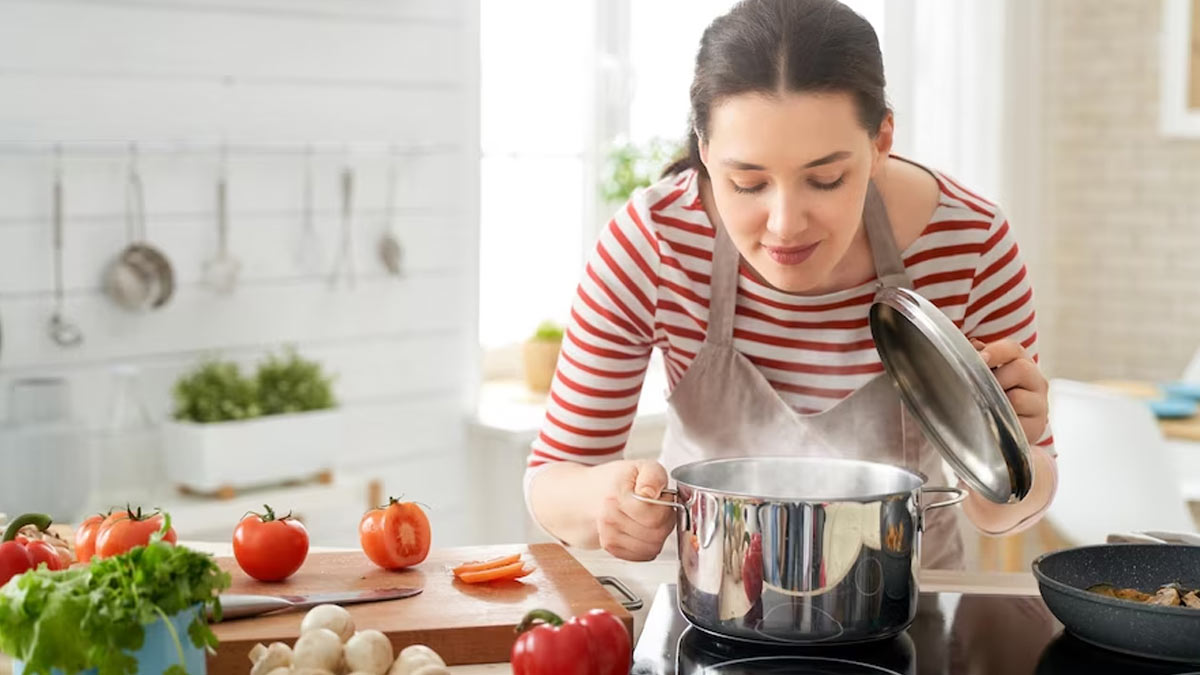
Cooking is a daily ritual for many of us, and it's a wonderful way to nourish ourselves and our loved ones. However, certain cooking habits, if left unchecked, can have adverse effects on our health. According to Lancet’s ‘2015 Global Burden of Diseases, Injuries, and Risk Factors (GBD) Study,’ dietary risks accounted for 12.2% loss in full health years for men and 9% loss for women. Here’s a list of awful cooking habits that you should give up right away if you want to improve your health:
Table of Content:-
#1 Excessive Use of Cooking Oils
While fats are essential for a balanced diet, overusing cooking oils can lead to excessive calorie intake and health issues. High consumption of saturated fats, like those found in some cooking oils, is linked to heart disease. Opt for healthier oils like olive, avocado, or coconut oil, and use them in moderation.
#2 Skipping Fresh Ingredients for Processed Foods
Using pre-packaged or processed foods might save time, but they often contain high levels of salt, sugar, preservatives and unhealthy additives. These can contribute to obesity, high blood pressure, and other health problems. Choose fresh, whole ingredients whenever possible to control what goes into your meals.
Also Read: Ultra Processed Food: Here Are Some Health Risks Associated With It
#3 Not Using Enough Herbs and Spices

Herbs and spices not only add flavour but also provide health benefits. They can reduce the need for excessive salt, sugar, or unhealthy sauces in your dishes. Experiment with herbs like basil, and rosemary, and spices like turmeric, cumin, and chilli flakes to enhance the taste of your food while boosting its nutritional value.
#4 Overcooking Vegetables
Overcooking vegetables can lead to nutrient loss. To retain their vitamins and minerals, try steaming, roasting, or lightly sautéing vegetables instead of boiling them for extended periods. This will preserve their texture and nutritional value.
#5 Ignoring Food Safety Practices

Neglecting food safety can lead to foodborne illnesses. Always wash your hands, cooking utensils, and cutting boards before and after handling raw meat or poultry. Cook meats to the recommended internal temperatures, and store leftovers properly to prevent bacterial growth.
#6 Using Damaged Non-Stick Cookware
Scratched or damaged non-stick cookware can release harmful chemicals when heated. Replace damaged cookware and use wooden or silicone utensils to prevent further damage.
#7 Cooking at High Temperatures with Non-Heat-Resistant Oils
Heating oils to their smoke point can create byproducts. Use oils with higher smoke points, like peanut or grapeseed oil, for high-temperature cooking. Olive oil, with its lower smoke point, is better for lower-heat preparations.
#8 Excessive Use of Sugar and Salt
Adding too much sugar and salt to your dishes can contribute to weight gain and high blood pressure. Gradually reduce the amount you use in your recipes, and explore alternative seasonings and sweeteners.
Also Read: Excess Salt Consumption: What Happens When You Eat Too Much Salt
#9. Not Planning Balanced Meals

Randomly throwing ingredients together can lead to unbalanced meals. Aim for a combination of protein, carbohydrates, healthy fats, and a variety of vegetables in each meal to ensure you get a range of nutrients. You should also exercise portion control. Large portion sizes can lead to overeating and weight gain. Be mindful of portion sizes, and use smaller plates to help control your portions visually.
#10 Cooking Food On High Flame
Cooking your food on high flame might enable you to reduce your cooking time, and help prepare meals faster. However, this practice causes foods to stay raw from the inside which can be extremely detrimental to health. Moreover, cooking foods on high flame means that you have to constantly keep stirring them to avoid charring. This deprives your food of beneficial heat from the utensil’s surface, and instead, it cooks in its own juices and might turn into an undercooked mush.
#11 Washing raw meats
Raw meat is covered with bacteria. Washing cold cuts will splash bacteria all over your kitchen. Instead, rely on cooking raw meats thoroughly to kill the bacteria and avoid contamination.
Cooking is an art. When done right, it can be a significant contributor to your overall well-being. By avoiding these awful cooking habits and adopting healthier practices, you can ensure that your meals not only taste better but also promote good health. Remember, small changes in your cooking habits can lead to big improvements in your overall health and lifestyle.
Disclaimer: This article is for informational purposes only and should not be considered a substitute for professional medical or dietary advice. Please consult with a healthcare provider or nutritionist for personalised guidance on your diet and cooking habits.
Also watch this video
How we keep this article up to date:
We work with experts and keep a close eye on the latest in health and wellness. Whenever there is a new research or helpful information, we update our articles with accurate and useful advice.
Current Version
